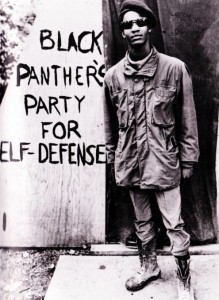





Fifty years ago, the United States was in a period of tremendous social upheaval and cultural change. The Civil Rights Movement led by Dr. Martin Luther King had resulted in new federal legislation outlawing discriminatory laws, but police brutality and economic inequality rampant in black communities.
In Oakland, California, Bobby Seale and Huey Newton knew that Lyndon B. Johnsons War on Poverty and Kings path of nonviolent resistance weren't enough to bring about the changes black people in America needed.
Spurred by the assassination of Malcolm X, they began calling themselves Black Panthers. They combined Black Powers militancy with socialist ideology, and infused funk music with Franz Fanons writings. Armed with rifles and shotguns, they monitored police activity in black neighborhoods. Through their weekly newspaper and funk band, they captured peoples imaginations. They created survival programs for the black community " community schools, free breakfast for children, healthcare clinics, political education classes, a newspaper, even an ambulance service.
The Panthers grew quickly into a national organization. By 1970, they had chapters in 68 cities, each with their own leadership structure. But shoot outs with rival organizations and the police, the incarceration of Panther leadership, internal strife, and infiltration by FBI informants took its toll. In 1972, the Panthers shut down their national chapters and consolidated their organization in their home base of Oakland. They shifted their focus to electoral politics, but that wasn't enough to slow their gradual decline; by 1980, there were just 27 active Panther members. Yet their impact on American culture, from music to style to community organizing, continues to resonate today.
Fifty years after the birth of Black Panther Party, we take a look at the lasting cultural legacy of the Black Panther Party through the eyes of the generations that followed.
- KBOO



